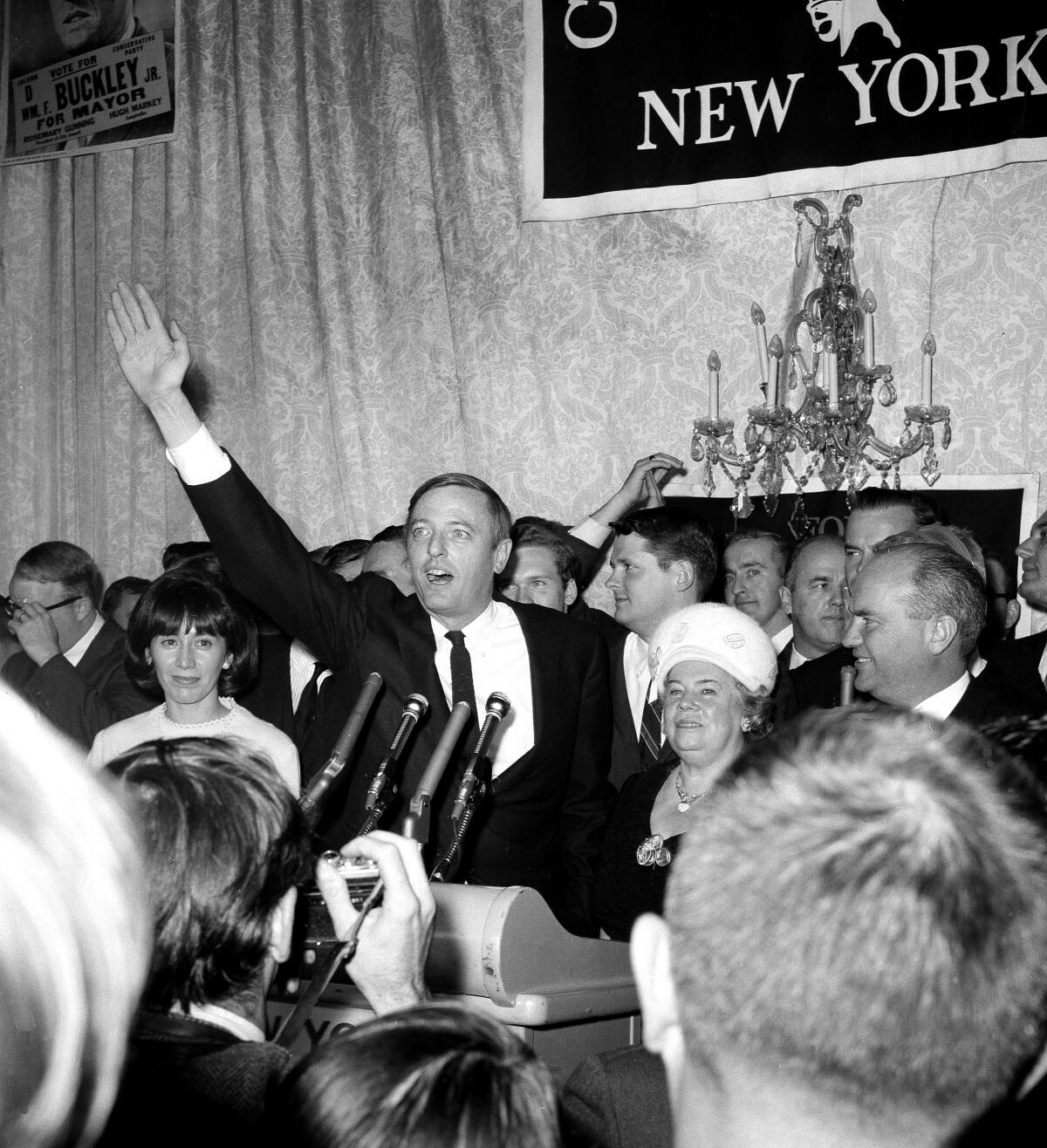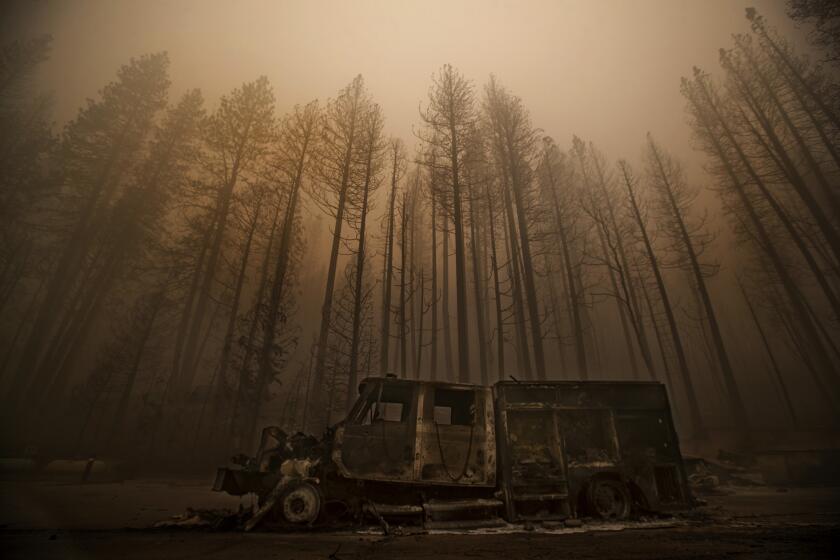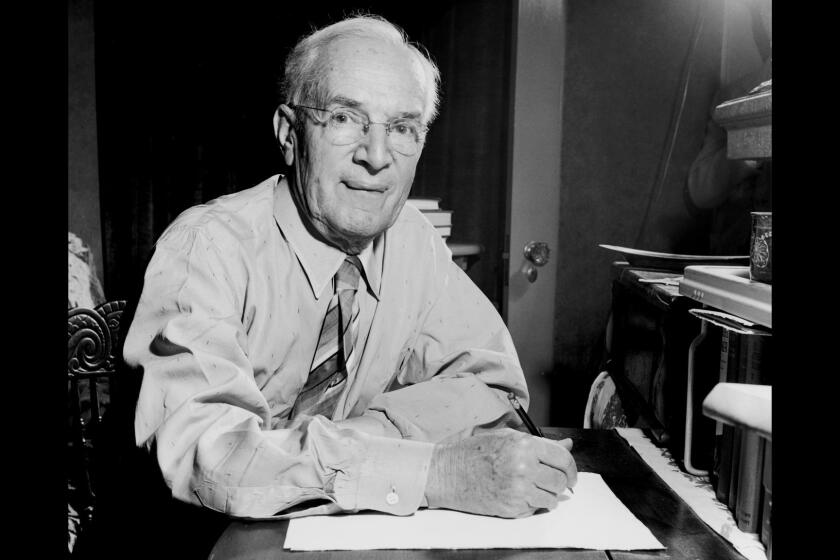Column: What history says about writers — like Nicholas Kristof and J.D. Vance — running for office

- Share via
Lots of wannabes with no political experience are running for office these days.
Matthew McConaughey — yes, the actor — is considering a campaign for governor of Texas. Former decathlete and Wheaties spokesperson Caitlyn Jenner just ran in California’s gubernatorial recall. Andrew Giuliani, a former professional golfer whose only apparent political credential is that he’s Rudy’s son, has entered the race for governor of New York.
These candidates are manifestly unqualified for public office and, for the most part, they haven’t been taken very seriously by the news media. Thank heavens.
But there are two political novices currently running for high elective office who are receiving far more respectful treatment, perhaps because they’re neither actors nor athletes nor reality TV stars. They’re serious people. They’re writers.
Opinion Columnist
Nicholas Goldberg
Nicholas Goldberg served 11 years as editor of the editorial page and is a former editor of the Op-Ed page and Sunday Opinion section.
I’m referring to “Hillbilly Elegy” author J.D. Vance, who is running for U.S. Senate from Ohio as a Republican, and opinion columnist Nicholas Kristof, who just quit his job at the New York Times to run for governor as a Democrat in his home state of Oregon.
Both are first-time candidates. Both have a dollop of celebrity. Both are getting lots of ink.
But history suggests that, despite the splash they’re making, they, might want to temper their expectations. Not because they have nothing to offer. But because writers who run for office usually lose.
There are a few exceptions to this rule. One — if you go back nearly a century and a half and cross the ocean — is British Prime Minister Benjamin Disraeli. He had published nine novels and almost as many books of nonfiction before he was elected to the House of Commons in 1837. He continued churning them out as he “climbed the greasy pole” of politics, as he put it.
Chalk one up for the scribblers.
But after Disraeli, success stories become hard to find.
It’s not that people don’t care about global warming. It’s just that they don’t seem to care in rational proportion to the enormity of the problem.
William Randolph Hearst served two terms in Congress in the early 1900s, but he was a press baron and zillionaire, not a writer himself. (Besides, he lost races for mayor, governor and president.)
Three decades later, the left-wing novelist and muckraking journalist Upton Sinclair ran for governor of California in 1934. “You have written enough,” he remembered saying to himself. “What the world needs is a deed.”
He ran a Capraesque campaign to repair the state’s Depression-ravaged economy and put hundreds of thousands of unemployed Californians back to work. His “End Poverty in California” platform promised cooperative farms and factories, pensions for the elderly and the state’s first income tax.
Ultimately, Sinclair was defeated by two things: his writing and the right-wing business interests who hated him, including the Los Angeles Times. This newspaper ran an attack on Sinclair each day in a box on Page One, calling him an “apostle of hatred,” denigrating his supporters as “maggots” and “termites” and turning his own words against him. Given the many powerful forces he’d attacked over the years, that wasn’t too difficult.
Although Donald Trump’s presidential campaign has understandably garnered more headlines, the campaign of Vermont Senator Bernie Sanders is truly the one worth parsing.
Then there was novelist Norman Mailer, who ran for mayor of New York on a ticket with newspaper columnist Jimmy Breslin, who was running for City Council president.
It was 1969, the year of Woodstock, and the two flamboyant writers proposed making the city the 51st state, banning cars from the streets and building a monorail that would encircle Manhattan. They wanted free bikes in city parks and cops who lived in the neighborhoods they patrolled.
They were crushed in the primary. Top staffers conceded that the campaign was hobbled by its “insecurity, madness and a lack of discipline,” including at least one off-message drunken speech by Mailer.
Patrician novelist and essayist Gore Vidal ran once for Congress in 1960 and then 22 years later ran in the Democratic primary for U.S. Senate against Jerry Brown in California. But Vidal, the bestselling author of “Myra Breckinridge” and historical novels such as “Burr” and “1876,” was neither humble nor self-deprecating, which undoubtedly alienated some voters.
“There is not one human problem that could not be solved if people would simply do as I advise,” he said.
The people begged to differ.
I asked him to mask up and enlisted a flight attendant, but I settled for 11 hours next to a nitwit rule-breaking anti-masker.
Conservative author and editor William F. Buckley, like Mailer, ran for mayor of New York in the mid-1960s.
When asked what he would do if he won, he responded, “Demand a recount.”
Buckley had serious political arguments to make but little respect for the degrading traditions of retail campaigning.
“I will not go to Irish centers and go dancing,” he said at his first news conference. “I will not go to Jewish centers and eat blintzes, nor will I go to Italian centers and pretend to speak Italian.”
Not surprisingly, he lost too.
The list goes on. L.A.-based journalist Mickey Kaus tried unsuccessfully to wrest the Democratic nomination away from Sen. Barbara Boxer in 2010. Pat Buchanan, a former editorial writer for the St. Louis Globe-Democrat, lost three presidential elections.
In recent decades, two writers have risen to the top, but not in the U.S.: two-time Czech president, Velvet revolutionary and playwright Vaclav Havel, and onetime journalist and now prime minister of the United Kingdom Boris Johnson.
What are we to take from all this? That some writers are serious about politics and some are not. Some are merely provocateurs. Or they may be too arrogant for campaigning, or just very bad at it. Also, voters are skeptical of writers.
Vance and Kristof seem serious enough. Vance‘s pitch is that his hardscrabble background gives him a special empathy for “left-behind” working-class Trump voters. Kristof is revered by many liberals for his crusading social justice journalism from around the globe.
J.D. Vance was born into love, abuse and decline.
In recent years, data show, voters have grown more willing to take chances on candidates who lack previous political experience, so maybe these writers have a shot.
Of course now that they’re running, they may have second thoughts. They may find retail campaigning demeaning, as Buckley did, and fundraising tiresome.
And if they were actually to win, they might find that the satisfactions of the job are exaggerated, especially compared to kibitzing safely from the sidelines.
More to Read
A cure for the common opinion
Get thought-provoking perspectives with our weekly newsletter.
You may occasionally receive promotional content from the Los Angeles Times.















